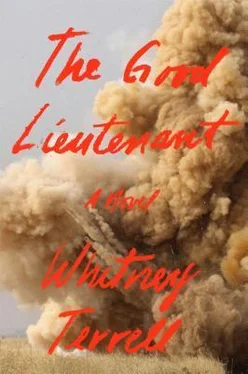“I’m just saying,” he continued, “if we’d had a camera at the exact same intersection two months ago, we would’ve stopped that truck bomb, don’t you think? No truck bomb, no dead soldiers. And if there aren’t any dead soldiers— and we already have a camera set up — then nobody’s out at the Muthanna intersection yesterday.”
“Maybe,” McKutcheon said. “Except that truck was stopped two months ago. Fredrickson and Arthur checked the driver’s papers before the bomb went off.”
A small electrified charge lit Pulowski’s stomach, a feeling that resembled the spark of despair when he found bad code early in a command — from this fork branched a thousand possible mistakes. “Why would they do that?”
“They let the truck through,” McKutcheon said, “because, apparently, we were paying an Iraqi contractor to haul gravel to a construction site inside Muthanna. Spreading a little U.S. taxpayer money around. Somebody must have slipped the driver the right papers. Not to mention filled him in on our entire routine.”
“We were paying the bomber?”
“Or at least his boss. Look, you got off of this detail easy, Pulowski. Everything about the Muthanna intersection has been a clusterfuck from start to finish. Setting the cameras up yesterday was strictly a cover-your-ass project for the colonel. It didn’t work. He’s got a bigger problem on his hands now. If I were you, I’d leave it that way.”
He smiled at the comforting Homer Simpson nihilism of McKutcheon’s advice. He’d been called in to work intel when Alpha Company lost a tank back in January. The ambush outside Al-Shula. During all these disasters McKutcheon had talked this way.
By then he’d slipped into the battalion’s “Cyber Café,” which occupied a ramshackle wood shed, and a private showed him to an ancient, clicking Acer computer, set on a long plastic folding table, bookended by a pair of palm trees. It was in the base’s smaller public spaces — the toilets, phone banks, and computer clusters — that McKutcheon’s philosophy made the most sense. A half dozen soldiers hunkered around him, heads bowed, boots spread wide, postures submissive — already defeated — before happy onscreen cornucopias of bank ads, Web graphics, and interactive news feeds. One had begun to cry, hands clutching the back of his head. All of them were or would soon be involved in the hunt for Beale, and every inch of their unhappiness could be explained and even possibly prevented by his own personal cartoon slogan: Safety Comes in Can’t.
He’d invented it in this very room, on similar nights when shit had gone bad and he had sat here trying to email his mother, staring up at a plastic banner mounted by the same geniuses who’d named the cafeteria Camp Chillin’:
SAFETY COMES IN CANS
I CAN
WE CAN
YOU CAN
What if somebody, somewhere, had simply argued that the safest thing was can’t ? Even Senator Kerry hadn’t quite had the guts. He’d stood there, grim and hatchet-faced at the convention, watching can-do photos of his Vietnam days, and then the swift boats came and took him out. Why? Because ’Nam had been a great big pile of can’t. As a signal officer, can’t was one principle Pulowski never sold short. The other came from a book he’d read for English class at Pitt, whose touchy-feely motto he’d also Homerized: Do not connect. Both self-evident truths, nowhere more obvious than in the pleasures of the Cyber Café when shit was truly going bad. The fact that he’d never managed to convince Fowler to see any of that wasn’t his responsibility.
At the same time, none of this accounted for how he’d felt when he’d watched Carl Beale disappear into that alley doorway. That was the tidal wave of stupid that he’d been counting on McKutcheon to talk him out of, its oncoming boil cold and gray, carrying with it death and rot, wreck and stink. “So what you’re telling me,” he said, “is that we have a device that might very well … no, no, no … would be demonstrably helpful to our soldiers in the field. Americans. People who you and I know personally. And yet you’re lying about its readiness because … why? Because we’re afraid to go outside the wire and set up the thing?”
The phone was dead by then. When he hung up, Pulowski stared for some time at the email on his screen, reading first the text, and then allowing his eyes to swim across the Kelly-green banner flashing at the top of the screen:
E*TRADE — DISCOVER THE POWER OF YOU
Also deeply stupid. Also clearly not a message designed for geeks. It would’ve been much better if he hadn’t worn the shirt. He’d figured out by then why it didn’t fit. Every time he stretched the fabric down around his belly button, he could smell Fowler’s scent drifting up out of it. Then he cut-and-pasted Colonel Seacourt’s email into the top line, CC’d everybody except McKutcheon, and typed:
Sir,
I am the project coordinator for the mobile camera network. There has been a miscommunication between myself and Major McKutcheon. The camera system has been fully tested and is ready for deployment. I will have it outside the offices of the 16th Engineer Brigade at 0800 hours tomorrow morning, ready for pickup.
Sincerely,
LT Dixon Pulowski
Then he hit send.
* * *
Patrol Base Fortitude was no larger than a high school football stadium, set out in a bean field forty miles north of Camp Tolerance, surrounded by blast walls, domed by empty sky. Fowler handed the note to Captain Masterson on the doorstep of the farmhouse that served as his TOC. Her convoy had arrived the night before and she could feel her soldiers watching from the barren infield as she explained how Pulowski had gotten the note, and why it might be a clue to Beale’s abduction. It could be nothing, she admitted, but she’d like to talk to his interpreter just to be sure. Masterson listened, forefinger rubbing his tallow cheeks, and then abruptly headed toward the base’s motor pool — followed by Fowler, who didn’t know what else to do. Once they were out of sight, Masterson veered right toward a concrete hut with sandbagged windows. Out front, his first lieutenant, Anderson, stood quickly from a plastic chair.
“All right.” Masterson stopped short of the building’s door, which had been fitted with a shiny brass lock. “Trust me, Lieutenant. This is not something you’re going to be excited about. The advice I’m giving you is to go home and forget it.”
“Yessir,” Fowler said. “I just—”
“Do you know where we are, Lieutenant?”
“We’re at the intersection of Route Tender and Route Trap.”
“Actually, this base is on the border between the Al-Tamimi tribe, which is Shi’ite, and the Al-Dulaymi tribe, which is Sunni. It’s like having an apartment in Watts between the Bloods and the Crips. All those guys at the schoolhouse? Sunni. Except for Faisal, no Shi’ites came. So trust me when I say you have no idea where you are.”
Fowler returned this stare bluntly for a few moments, asserting — what, exactly, she wasn’t sure. That she was as capable of being overconfident and condescending as Masterson? That she hoped he knew more about the local population than he did about South Central L.A.? Then she said: “Sir, I already requested backup. They’re coming out. All I want to do is talk to your interpreter. Is there some problem with that?” As she spoke, she felt a pinch on the insides of her wrists so strong that she rubbed them.
Masterson wrinkled his forehead as if still uncertain what to do with her. He glanced back at Anderson, who was unlocking the building.
“You’re free out here, sir,” she said, scrambling to register some argument that he might take seriously. “You’re free to operate.”
Читать дальше












